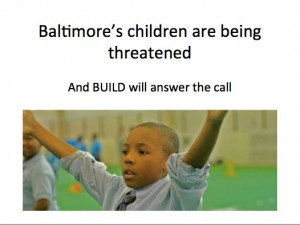BUILD Leaders Name the Deep Wounds that Cuts to City Schools Would Cause
By BUILD, Thursday February 19, 2015
When Jessica Ockimey, a single mother of 3 students in Baltimore City, learned about the governor’s proposed cuts to Baltimore Ciy Schools, She was “shocked at the enormous effect that these cuts would have on my children, our family finances, and our home life.”
Ockimey was speaking to a group of 120 members of Baltimoreans United in Leadership Development (BUILD), who gathered Thursday night at Roland Park Elementary Middle School to get informed and active on the proposed state funding cuts to Baltimore City Schools.

Her son recently moved from a less successful school to Hilton Elementary, where he was given an Individualized Education Plan and extra supports. He has made so much progress that he is now preparing to transition off of that plan. But will he stay off it?
The proposed budget cuts for Hilton would be catastrophic,” said Danielle Henson, principal of Hilton Elementary. If these budget cuts go forward, she expects Hilton to have over $100,000 less in the upcoming year.
Henson credited much of the school’s success and attractiveness to partnerships that enable the school to offer important programs like the afterschool program that serves Ockimey son with academic support and violin lessons. With a funding cut, “we’d have to take a closer look at our ability to continue our partnerships,” Henson said. “Our students would be without resources and enrichment opportunities that they wouldn’t get (elsewhere).”
Cuts would also increase class size, possibly driving some classes to 50 students or more. “These [cuts] prevent us from providing a standard of care… These budget cuts keep our students in a position where they are not able to compete globally.” Henson cited the need to meet growing demands for student and school performance. “With the current curriculum and the common core our students need opportunities and support.”
For Jessica Ockimey, this is personal. “I’m worried that the gains [my son] has achieved in the last few yeas will be undone by these cuts,” she says. She also worries that Hilton will need to discontinue their afterschool program, or require a fee for the program, which she could not afford. “These services are a necessity to keep my family thriving.”
Leaders from faith congregations, schools, neighborhood associations, youth-serving organizations and a job-training program got a thorough presentation on the three proposed cuts (pictured below, available here: BUILD 2015 Education Cuts Presentation), discussed the significance of cuts in small groups, and got a clear call to action.
BUILD plans to work to support the Baltimore City delegation in Annapolis, which has united around funding cuts as their top priority issue this session. The group will also pressure the governor through a consistent presence in Annapolis through the end of the legislative session on April 13, 2015.
Approximately twenty BUILD leaders will lobby in Annapolis tomorrow, and sixty-five leaders – half of those present – pledged to lobby legislators in Annapolis in March. Other people made pledges to educate friends and family members, and use relationships to reach out to state politicians.
The group also discussed how subsidized development has reduced state support (as it did in an op-ed in the Baltimore Sun Friday, Feb 13). Clergy Co-chair Andrew Foster Connors explained that BUILD has used subsidies to rebuild East Baltimore. “We are not against subsidies,” he said, but against “developing Baltimore on the backs of our children” by making deals that do not safeguard educational funding.
The group continues to call on the Mayor to convene corporations and developers in Baltimore to make up any remaining cuts to Baltimore schools.
For some, this is déjà vu.
Elizabeth Reichelt, a mother of three students at Roland Park, said “I feel like I am living the movie Groundhog Day.” In 2009, her son was in a class of 31 students when the city faced a proposed $23 million dollar state funding cut. BUILD formed the Baltimore Education Coalition with the ACLU and other organizations and reversed that cut, as well as reversing or reducing cuts annually in 2010-2012.
Reichelt said she was “stunned and infuriated” when she saw the announcement of the proposed cuts. “The saving grace in all of this is that we are here together in all of this as BUILD,” said Reichelt, who was a leader in these campaigns. “We have faced a similar challenge in the past and we won then. We will win again.”


